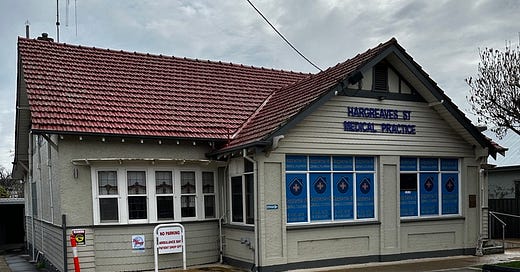In this episode, we explore why building a habit of listening for ‘weak-signals’ is so important
Over the past few weeks I’ve been revisiting those previous posts here on ‘Noticing’ and on ‘The quiet ones‘, and the challenge and of finding the important ‘weak-signals’ amidst all of the everyday noise.
One context where this matters as a lot is in healthcare, where the weak-signals often arise in what isn’t said at first in the everyday consultations with the family-doctor or the nurse at the local healthcare-clinic.
For me, this came up again on Twitter a few days ago, in a post byDr Zed Zha:
"One more thing," the patient says, right when I'm about to exit the exam room.
I used to be annoyed by it. Until one day, a patient's "one more thing" was actually "the" thing she wanted to say. But she needed to feel me out and make sure I was a safe person first. So, I sat back down and listened. Then we discussed and ran tests.
"You restored my faith in doctors." She took the bus just to tell me this today after making a full recovery. Her visit filled my heart with warmth and purpose.
If we ask people to wait for months for their appointments, then (sometimes) hours in our offices, we can hear them out for their one more thing.
This was followed by some very good comments about the importance of listening for that ‘one more thing’, both from patients:
"I finally found a doctor like you, who takes time, builds trust, listens, tests before treating. But for years I was dismissed and ignored. You're doing important work. Thank you."
"I am having major surgery tomorrow. Your tweet is so well timed. I have fears, concerns, and questions I am afraid to say for fear of being told I am a baby/overreacting."
"My "one more thing" was actually about my Mom who has Alzheimer's. Once she knew about it she always asked about how Mom was doing. Then when we were in crisis she helped us get the help we needed to better take care of Mom. I will be forever grateful."
…and from medical colleagues:
"I did a piece of research in GP practices in the 90s. We looked at psychological problems of children presenting to GPs. What we learned was mothers often took their children for one thing (often physical) and the mothers’ “one more thing” was their OWN psychological issue."
(a nurse) "Yes. Usually for me it's "we need [x/y/z] when you come back" but every now and then it's a parent - or a kiddo - at the edge of pouring their guts out, in need of a good cry. Listening is the most important thing I can do; often, the only. For the record, I give excellent hugs"
And I remember my parents saying much the same about this, in their rural surgery in a quiet backwater of south-east England. It used to be described as a doctor’s ‘bedside manner’ - that they needed to listen carefully for the undertones, that the real issue that the patient was facing would come out kind of sideways, muttered under the breath, alluded to rather than spoken outright, and had to be gently teased out, like unravelling a tangled ball of wool. So much fear, often: the surface-issues were easier to face, and to talk about with the doctor, but that surface-issue wasn’t the real issue that mattered most…
It happens to all of us, I guess. I’ve been there myself a few times, and yet couldn’t find the courage to ask for that ‘one more thing’. Still can’t, perhaps.
So yeah, being with someone who does have the skill and care to listen out for that near-silent cry for ‘one more thing’ would really help when it’s really needed… and it makes so, so much difference when someone does.
Yet how does all of this apply at the big-picture level? Short-answer: build that habit of noticing, and watch for the quiet ones, the small quiet voices that so easily drowned out by the big-picture noise. For example, climate-change used to be one of those quiet voices, unheard by anyone other those who took care to listen: but, no, having been ignored for so long, it’s hitting hard enough that anyone other than the most wilfully deaf and blind have become painfully aware of its reality. But it’s more at the small-changes level where we need to watch right now - that stage before things become inescapable. Small issues, often relatively local: here in Australia, for example, one of the dysfunctions of the possession-economy is that there’s a severe shortage of places to rent, right at the time when climate-change has forced people out of their homes through fire and flood. Internal refugees from that kind of cause are becoming a reality here already - and yet that fact is still barely visible to most people as yet.
Once we can see it, of course, the next challenge is to identify what we can do about it, and then take whatever action we can - our ‘response-ability’, in a very literal sense. Yet first we do have to able to see it, whatever it is - and for that to happen, we must build our skills and practice in noticing, to be able to hear our world’s quiet call for that ‘one more thing’.




Amazing story and great pick... 'one more thing' ... everyone must have experienced this with different conversations, ... should I call it nirvana of the conversation... where one is in good confidence that other person is "actively listening" to them and they will not be judged for this one more thing... conversations / meetings are in complete unless we actually reached this state... where people feel that psychological safety and start expressing... and it can lead to the beginning of another conversation / meeting / relationship... great work Tom !